UN MIGRATION AGENCY JOINS CIVIL SOCIETY AND UN INITIATIVE
UN Migration Agency Joins Civil Society and UN Initiative Calling for Global Compacts to Protect Migrant Children – With intergovernmental discussions leading up to the Global Compacts on Migration and Refugees currently taking place, all parties must work together to address the needs of migrant children consistent with their human rights.
Today (12/06), at the Global Conference on Children on the Move, in Berlin, Germany, the UN Migration Agency (IOM) joined more than 20 UN and civil society organizations to unite around the rights of children, especially children on the move. The conference with more than 250 participants from States,
civil society, academia, UN agencies, private sector and individual experts aims to ensure that both Global Compacts – on migrants and on refugees – take into account children’s priorities and concerns.
“Every day at the UN Migration Agency, we work with migrant children. Some have been compelled to move accompanied by relatives or guardians or on their own due to conflict, disasters, fear and despair.
Other children migrate in search of better socio-educational opportunities and ultimately to pursue their own development and that of the society they live in,” said William Lacy Swing, IOM Director General, when discussing the preparations for the Conference.
“We want to ensure that child migration is always in the best interests of the child and that when it is not, sustainable solutions are found for children and their families both at home or in a new home elsewhere. These solutions should ensure that children are not left behind and that they are not exploited
or even worse: trafficked. All migrant children are entitled to care and protection regardless of their migratory status,” concluded Ambassador Swing.
Different factors contribute to migrant children’s situations of vulnerability, including their age, risk factors at individual, household, community and structural levels, the reasons why they have migrated, and the conditions they face during travel, transit, and at destination.
IOM will continue to strive for migrant children’s wellbeing and best interests across the wide spectrum of activities the Organ
Today (12/06), at the Global Conference on Children on the Move, in Berlin, Germany, the UN Migration Agency (IOM) joined more than 20 UN and civil society organizations to unite around the rights of children, especially children on the move. The conference with more than 250 participants from States,
civil society, academia, UN agencies, private sector and individual experts aims to ensure that both Global Compacts – on migrants and on refugees – take into account children’s priorities and concerns.
“Every day at the UN Migration Agency, we work with migrant children. Some have been compelled to move accompanied by relatives or guardians or on their own due to conflict, disasters, fear and despair.
Other children migrate in search of better socio-educational opportunities and ultimately to pursue their own development and that of the society they live in,” said William Lacy Swing, IOM Director General, when discussing the preparations for the Conference.
“We want to ensure that child migration is always in the best interests of the child and that when it is not, sustainable solutions are found for children and their families both at home or in a new home elsewhere. These solutions should ensure that children are not left behind and that they are not exploited
or even worse: trafficked. All migrant children are entitled to care and protection regardless of their migratory status,” concluded Ambassador Swing.
Different factors contribute to migrant children’s situations of vulnerability, including their age, risk factors at individual, household, community and structural levels, the reasons why they have migrated, and the conditions they face during travel, transit, and at destination.
IOM will continue to strive for migrant children’s wellbeing and best interests across the wide spectrum of activities the Organ
‘ASSAM’S BLACK GOLD: THE IMPERIAL MOMENT’
NMML Invitation for Special Lecture_’Assam’s Black Gold: The Imperial Moment’ by Prof. Arupjyoti Saikia at 5.00 p.m on 14th June, 2017
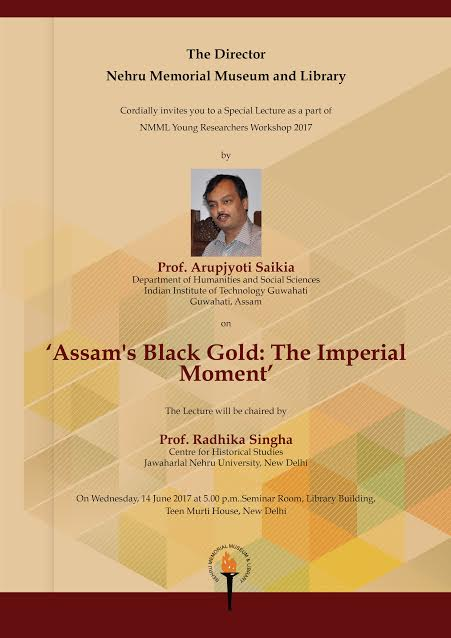
INDIAN PUBLISHERS PARTICIPATING AT FRANKFURT BOOK FAIR
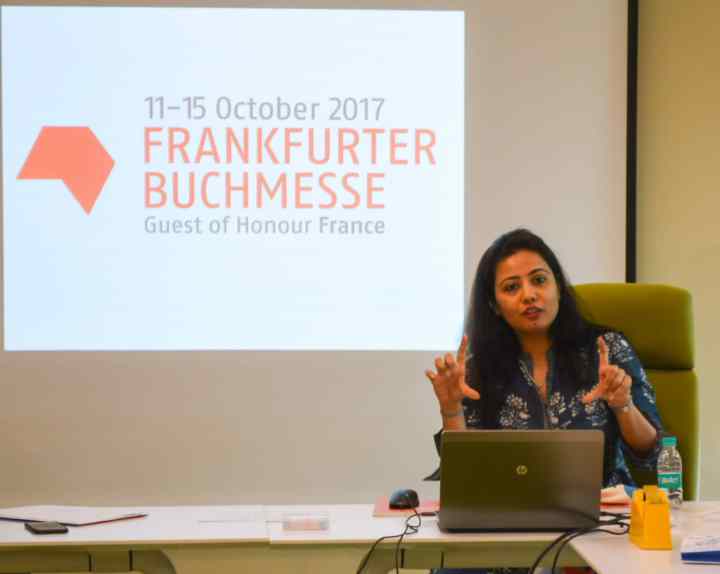
The Embassy of France and Institut français Indiawere proud to host a Business Breakfastfor Indian publishers participating at Frankfurt Book Fairon Friday 26th May 2017 at Institut français India, New DelhiNew Delhi, 30 May 2017Institut français India and German Book Office hosted Indian publishers at a Business Breakfast on Friday 26th May 2017 at Institut français India, New Delhi. Croissants in one hand and pen in the other, 25 publishers, representing literature of all genres (fiction, non-fiction, children’s books, graphic novels) met with the organisers at Institut français India in preparation of their participation at the upcoming 69th Frankfurt Book Fair (11-15 October 2017) where France will be Guest of Honor. Publishers benefited from the tips given on logistic details and maximising one’s presence at the Book Fair. They were also given presentations on conferences and professional meetings set to take place during the Book Fair. The topic of the conference on the Indian markets, “The circulation of translations into English language”, taking place on Friday 13thNovember at the fair, was also discussed by publishers. The fair will provide Indian publishers an occasion to reaffirm their will to be key players in the English language market, and their capacity to offer diversity and richness in vernacular languages at the largest publishing event of the year.The invitation to France in 2017 offers a unique moment for the French language to reveal its openness to the world and showcase the know-how and ability of French cultural industries to innovate using written expression as a springboard. A rich and varied programme will highlight France’s attractiveness in all sectors: books, innovation, e-books, projects, trans-media, video games, music, visual arts, performing arts, not forgetting to include heritage, gastronomy, tourism, architecture, design and luxury goods. Ms Prashasti Rastogi, director of German Book Office in Delhi, expressed her high expectations about France’s excellent programme, while Dr. Nicolas Idier, Attaché for Books, Ideas and Knowledge at the Institut français India in Delhi, reaffirmed that France and Germany working together constitute a driving force in Europe and especially in the cultural industry.About the Frankfurter BuchmesseThe Frankfurter Buchmesse is the international publishing industry’s biggest trade fair – with 7,100 exhibitors from more than 100 countries, around 278,000 visitors, over 4,000 events and approximately 10,000 accredited journalists and bloggers – in attendance. It also gathers key players from other media, including the film and games industries. Since 1976, the Frankfurter Buchmesse has featured an annual Guest of Honour country, which showcases its book market, literature and culture to attendees in a variety of ways.
ALEXEI NAVALNY & 200 HELD OVER ANTI-KREMLIN PROTESTS
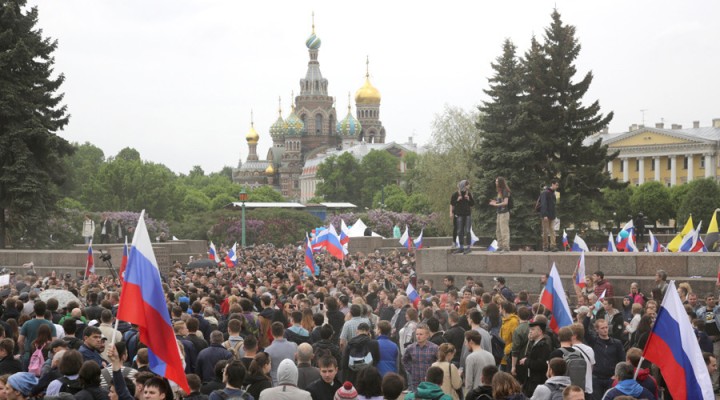
Alexei Navalny, the critic of President Vladimir Putin, was detained.
He was on his way to a planned anti-Kremlin rally in the heart of the Russian capital.
A police cordon at Pushkinskaya Square in Moscow is blocking people from going to Tverskaya Street. They are being asked to proceed either to the metro station or neighboring streets.
Police are urging people not to disrupt public order or break the law
Opposition demonstrations have been held in major Russian cities, as the country marks its national day. The Moscow protest location was changed from the authorized Sakharova Street to an unauthorized location on the eve of the event.
At the unauthorized protest on Tverskaya Street, police have made some “selective detentions,” RIA Novosti reported, citing the head of Moscow’s regional security department, Vladimir Chernikov.
“Provocateurs” who had been shouting slogans, climbed street signs and “behaved inadequately in the crowd” were detained, Chernikov told RIA Novosti.
Several thousand people have taken part in authorized opposition rallies in the Urals region. The protests have been peaceful and with no incidents, local police say.
2,000 people took part in an authorized rally in Yekaterinburg. In Chelyabinsk Region, around 2,500 protesters participated in protests, police said, with several hundred people also protesting in Tyumen, Kurgan, Surgut, and Nizhnevartovsk, among other cities.
The sanctioned opposition protest on Sakharova Street in Moscow concluded without incident, according to the Moscow police press service. Around 1,800 people participated in the event, according to police estimates.
“Police and National Guard maintained public order and safety, no serious violations of the public order were registered,” the police said.
- A sanctioned opposition protest has finished in the central Russian city of Belgorod, TASS reports, citing regional police spokesman Aleksey Goncharuk.“Ninety-five people attended the meeting, according to official information. As the organizers said, the event happened within the sanctioned bounds,” the spokesman told TASS.
- Opposition protests sanctioned by the authorities have ended in the cities of Surgut and Nizhnevartovsk in the Ural region.“The events concluded without any incidents. No one was detained,” police spokeswoman Olga Abmaykina told Interfax-Ural news agency.
- The police are urging people to leave the site of the unsanctioned protest on Tverskaya Street in downtown Moscow and move towards Pushkinskaya Square.RT news
GST PREPAREDNESS AMONG TRADERS A MAJOR CHALLENGE
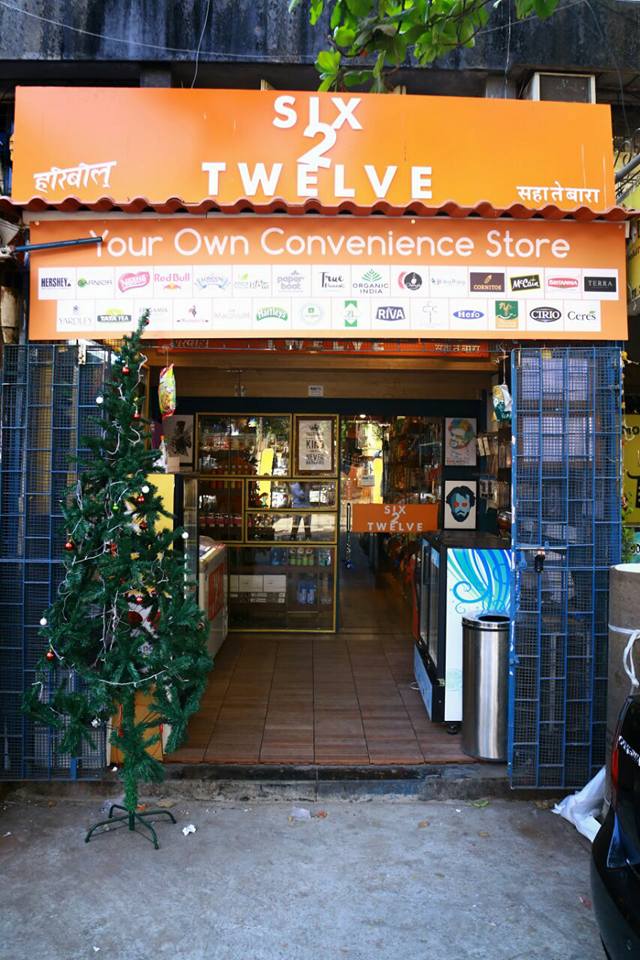
In the wake of implementation of GST in the Country from 1st July,2017, the preparedness at the level of small businesses is one of the major challenges. The proposed GST taxation system is entirely based on technology where not even a single paper will be used. The basic fundamentals of raising invoices, procedure of availing input credit, integration of goods & services, compulsory rating of each entity registered under GST are some of the key issues which are entirely different from current VAT tax regime.
On the other hand nearly 60% of small businesses in the Country have been devoid of digital technology and the basic challenge is that at a time when everything will be routed through digital technology under GST, how these large number of traders will be able to comply with GST from 1st July,2017. Empowerment of such large number of traders with technology in such a short span of time when only 19 days are left is quite impossible.
Calling it is as one of the major challenge, Mr Praveen Khandelwal, Secretary General of the Confederation of All India Traders (CAIT) which is strongly advocating GST in the Country said that education and empowerment of small businesses with basic fundamentals of GST and that of technology is certainly an important issue even from the fact that GST is a destination based taxation system where Consumer has to pay the tax and traders are the only last mile connect with Consumers and as such they have a significant role to play under GST.
Mr. Khandelwal said that till the time traders across Country are equipped with technology, some in between measures needs to be adopted to help the traders in compliance of GST through digital technology. He has suggested that Government should take Trade Associations across Country can be used as GST Facilitation Centre . Being in the markets itself, these locations would be much preferred by the traders. There is a need for the Government to reach out to Trade Associations. He has also suggested that Computer Kiosks can also be installed in commercial markets enabling the traders to do compliance against a nominal fee.
However, CAIT has suggested Trade Associations across Country to make clusters of 30 to 50 traders and connect them with an Accounting Professional who should assist traders in performing compliance obligations of all traders under the respective cluster.
CLEF HAS THREE MAIN OBJECTIVES,
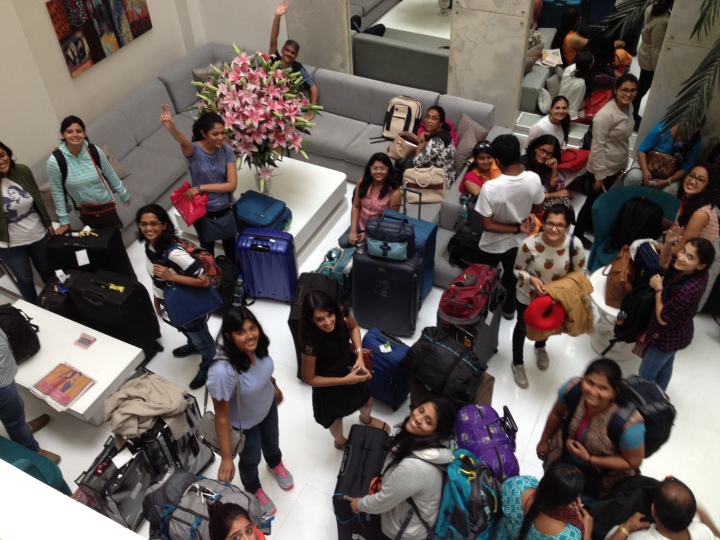
EDUCATION AND FRENCH LANGUAGE
The French Language, Education and Vocational Training (CLEF) service at Institut français India (IFI) has three main objectives, as defined by the French M
inistry of External and European Affairs:
International mobility: Cooperation in the field of education between France and India is embodied by the numerous school exchanges that have been established to meet the increasing demand of Indian schools. IFI also promotes international mobility through its two flagship programmes:
The English Language Assistants Programme – In this programme, Indian students are sent to France to teach English in French schools as assistant English teachers for a period of 7 months.
The French Language Tutors in India Programme – Under this programme, French university students are invited to teach French in Indian universities for a period of 9 months.
TEACHING ENGLISH IN FRANCE
Programme “English Language Assistants in France”
You have a good command of English and French. You can:
– Teach English in France.
– Attend classes in French universities.
– Discover France.
You need:
– IELTS (Academic – score 7.5+)
– B1 level of French or a B.A. French
This program of the Ministry of Education in France is managed, internationally and in India, by the International Centre for Pedagogical Studies (CIEP) and the Embassy of France in India. As part of this program, 40 to 50 Indian students are recruited as English language assistants in French public schools. The program allows these Alliance française or Indian university students to experience French language and culture, while providing their schools with their language skills and their rich culture.
The English Language Indian Assistants’ stay in France covers a period of seven months, from 1 October to 30 April of the next year. Appointed to secondary and primary schools, they provide support to English-language teachers.
Applicants must:
- Be an Indian citizen,
- Have student status (enrolled in a university or an Alliance francaise in India)
- Not have benefited from the “Indian English-language Assistants” program in the past,
- Hold a bachelor’s degree (or be enrolled in 3rd year)
- Be under 35 years of age on 1 October 2016.
- Having obtained the IELTS certificate (British Council/ IDP academic test) of English proficiency with a score above 7.5,
- Have a good level of French: minimum certification level B1 (DELF, TCF, TEF, etc.) or have received French B.A. French Honours from an Indian University.
The programme’s objectives:
- Support English-language teaching in French public schools.
- Linguistic and Cultural Discovery, immersion in a professional situation.
- Getting to the pedagogical practices of the French schools, especially for language teaching; assistants must indeed be integrated in schools and build an educational tender in accordance with instructions given by their English teachers.
- Strengthening ties and mutual understanding between French and Indian cultures.
- Education: Assistants are advised to attend classes, insofar as their professional obligations allow, at a French university.
For more information contact Jatinder Singh at jsi@ifindia.in(link sends e-mail)
ENGLISH LANGUAGE ASSISTANTS PROGRAMME IN FRANCE:
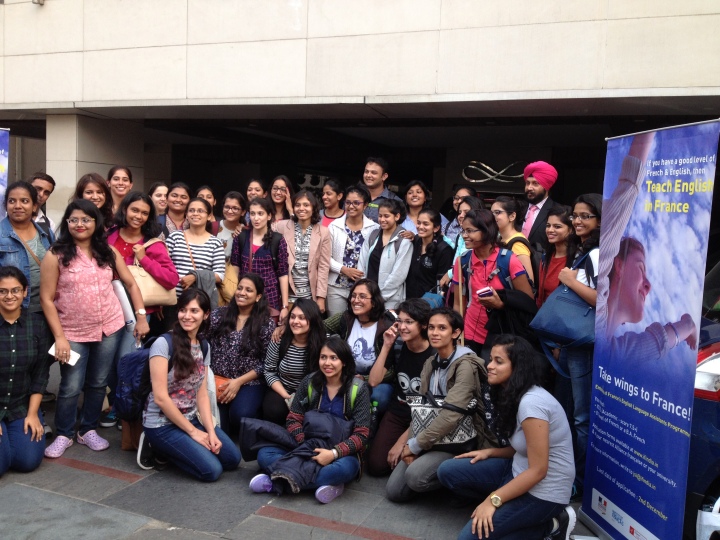
The Embassy of France and Institut français India are proud to announce this year’s
English Language Assistants programme in France:
79 Indian students selected for the academic year
October 2017 – May 2018
New Delhi, 08 June 2017
The French Embassy in India is happy to send 79 young Indian students to France, from October 2017 to May 2018, under the English Language Assistants programme supported and financed by the French Ministry of Education.
The worldwide assistants programme gives the opportunity to 6500 students from 60 different countries to spend one academic year in a school abroad. This programme was launched 20 years ago between France and India. In the framework of their bilateral cooperation in education, France and India have agreed to support the mobility of students, encouraging the internationalisation of their higher education training courses.
The 79 Indian students taking part in the teaching experience in France have been selected on the basis of their outstanding level of both French and English languages. They will be assisting English language teachers in primary, secondary and higher-secondary schools in France, by offering them a rich and dynamic understanding of a foreign language throughout the whole academic year. They will help develop links between French and Indian schools, teachers and students. They will also discover a new country, a new culture, while sharing their own culture with their students.
Students will gather In Delhi for an Information and Training Day led by the French Institute in India on 17 September 2017. They will also leave to France that evening.